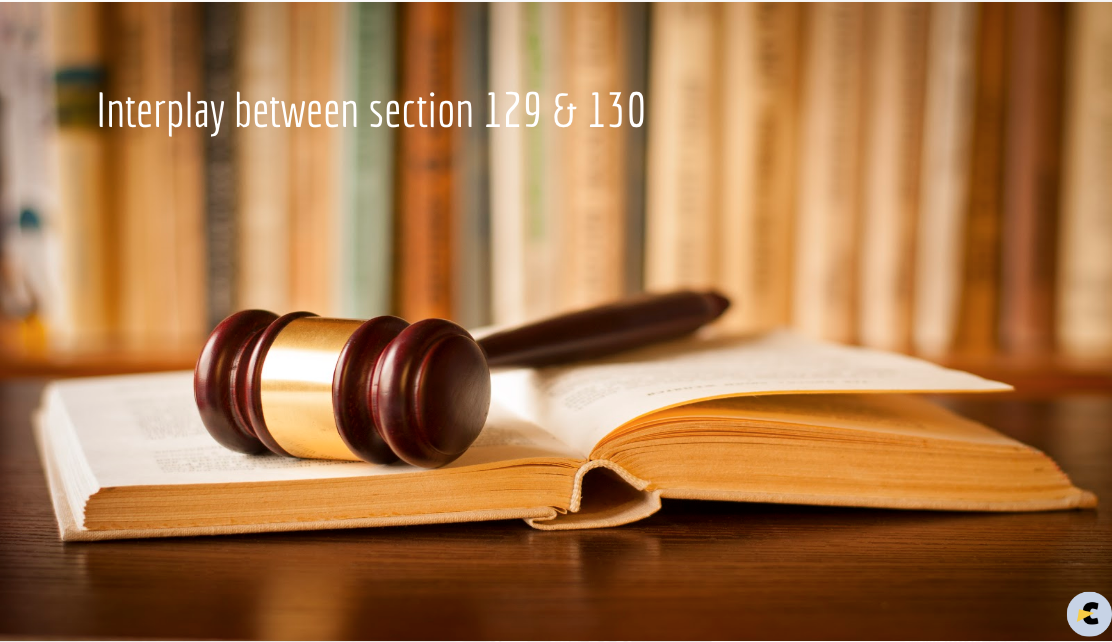Interplay of Section 129 & 130 of CGST Act
Section 129 & 130 of CGST Act
Section 129 & 130 of the CGST Act. Both have a non-obstante clause. They start with “Notwithstanding anything contained in this Act”. If there can be some instances when both of these will be applicable.
The plain reading of Section 129 of the Act would indicate that the same talks about detention, seizure, and release of goods and conveyances in transit. On the other hand, Section 130 talks about the confiscation of goods or conveyances and levy of tax, penalty, and fine thereon. Both the sections, therefore, should be interpreted harmoniously keeping in mind the object and purpose behind the enactment thereof. For the purpose of invoking Section 129 of the Act, all that is required is “contravention of the provisions of the Act or the Rules”, whereas specific circumstances are set out in sub-section (1) of Section 130 for invoking the provisions relating to confiscation which are basically related to “intent to evade payment of tax”. Thus, we are clear about one thing in our mind that both these sections are independent of each other.
Section 130 of the Act provides for specific situations or causes leading to the confiscation of goods/conveyances. There are five precise causes for the confiscation of goods and/ or conveyances specified in this section and they are:
| Action | Consequence |
| Supply or receive goods in contravention of the Act or rules made thereunder | Resulting in actual evasion of tax |
| Not accounting for goods | Carrying a liability to payment of tax |
| Supply of goods liable to tax | Without applying for registration |
| Contravention of the provisions of Act or rules made thereunder | With intent to evade payment of tax |
| Use of conveyance as a means of transport/for the carriage of taxable goods | In contravention of the Act or rules made thereunder |
Para 82 of Synergy fertichem Pvt Ltd Vs. State of Gujrat
The interplay between these two sections, Section 129 & 130
In the case of the Synergy Fertichem department invoked the both of the sections. Practically in all cases of detention and seizure of goods and conveyance, the authorities would straightway invoke Section 130 of the Act and thereby would straightway issue a notice calling upon the owner of the goods or the owner of the conveyance to show-cause as to why the goods or the conveyance, as the case may be, should not be confiscated. Once such a notice under Section 130 of the Act is issued right at the inception, i.e, right at the time of detention and seizure, then the provisions of Section 129 of the Act pale into insignificance.

Section 129, clause (6) provides that if the tax and penalty is not paid within 14 days of detention or seizure, then further proceedings would be initiated in accordance with the provisions of Section 130.
The first thing the authorities need to look into closely is the nature of the contravention of the provisions of the Act or the Rules. The second step in the process for the authorities to examine closely is whether such contravention of the provisions of the Act or the Rules was with an intent to evade the payment of tax. Section 135 of the Act provides for the presumption of culpable mental state but such presumption is available to the department only in the cases of prosecution and not for the purpose of Section 130 of the Act.
For the purpose of issuing a notice of confiscation under Section 130 of the Act at the threshold, i.e,. at the stage of Section 129 of the Act itself, the case has to be of such a nature that on the face of the entire transaction, the authority concerned is convinced that the contravention was with a definite intent to evade payment of tax.
 CA Shafaly Girdharwal
CA Shafaly Girdharwal
CA
New Delhi, India
CA Shaifaly Girdharwal is a GST consultant, Author, Trainer and a famous You tuber. She has taken many seminars on various topics of GST. She is Partner at Ashu Dalmia & Associates and heading the Indirect Tax department. She has authored a book on GST published by Taxmann.







